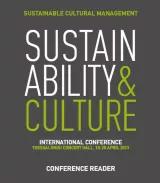Sustainability and Culture
The term “sustainability” is primarily associated with the theories and the approaches of ecology. It is a different way of planning human activities of all kinds, taking into account their possible (immediate and future) impact on the environment and focusing on the rational consumption of natural resources, with a sense of responsibility toward coming generations.
Human-centred and very broad in scope, the concept of sustainability has been considerably enriched in recent years and has become central to economic theory, development strategies and central political guidance implementation at the local, European and international levels.
The international conference “Sustainability and Culture: Sustainable Cultural Management” was intended to shed light on yet another aspect of this very fertile perception of contemporary reality. Culture does not exist on the sidelines of society, nor is it independent from it. It is an organic part of society and interacts with it. Every proposal for sustainable development in favour of the future of humanity should incorporate not just the social, economic and environmental dimensions, but also the cultural dimension, i.e. visions, utopias and
human creativity.
The first day of the conference was intended to highlight the great potential and the richness in the field of culture, as well as the ways in which culture can contribute to a global and international sustainable perspective, not in theory, but in practice. Representatives of national cultural organisations, senior government officials, special advisors on cultural policy-making, with international experience, independent innovative organisations that are already applying the principles of sustainability in culture, and acclaimed academics mapped out the field of this alternative approach to culture. Through arguments, case studies and their prestigious experience from Europe, USA and Canada, they lent meaning and content to the motto of our conference: “another way of thinking, another way of acting”.
On the second day of the conference, representatives of cultural organisations and public cultural institutions, artists and art and culture theorists, cultural managers, and representatives of educational and cultural establishments presented innovative and successful models of sustainable cultural management, with impressive results which point to the path to follow in future.
It would not be an overstatement to suggest that, internationally, this was the first time that the link between culture and sustainability was discussed in a conference with such a broad thematic scope and such indepth analyses, through so many exciting practical examples by so many eminent people of culture, technocrats and artists; all of them, after all, visionaries in their own ways.
